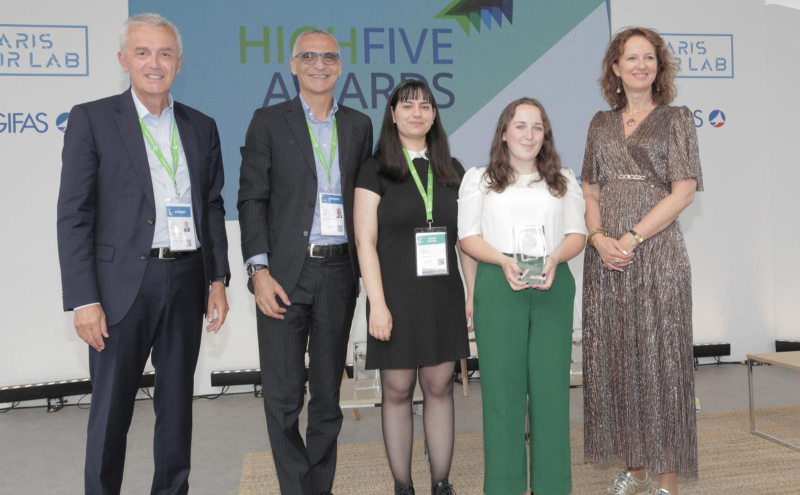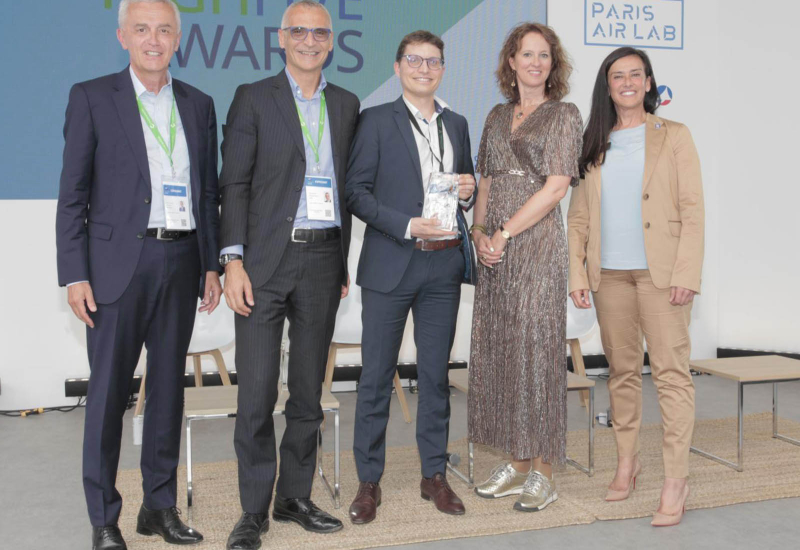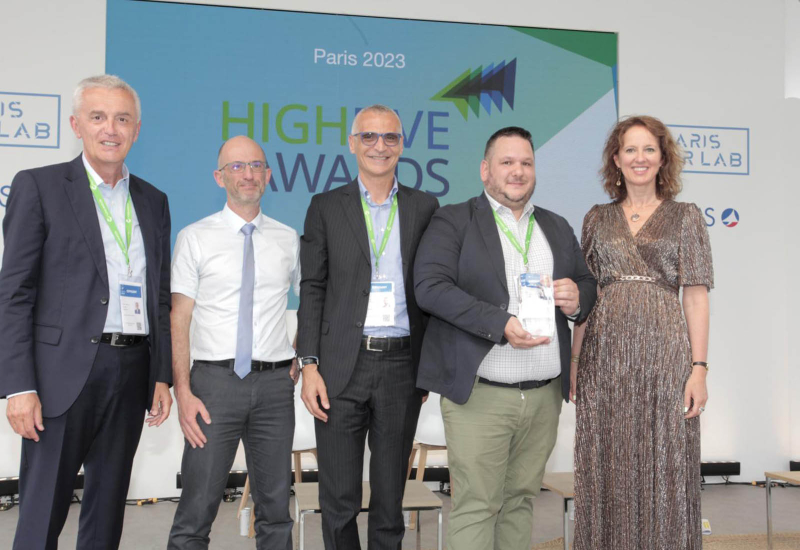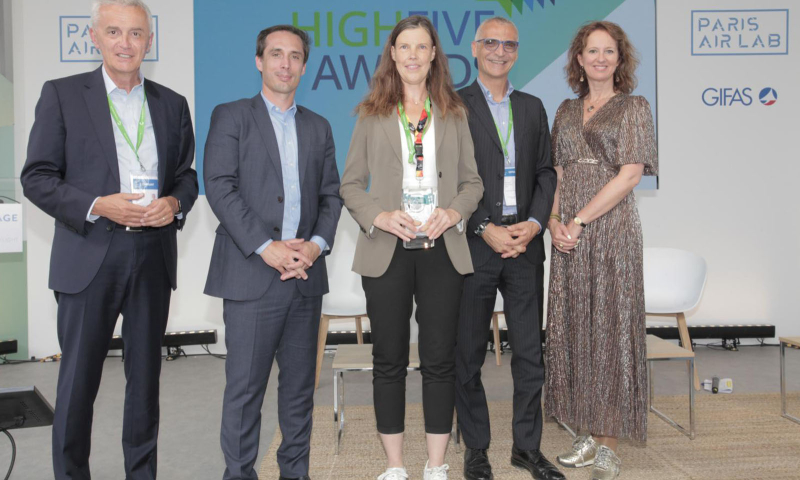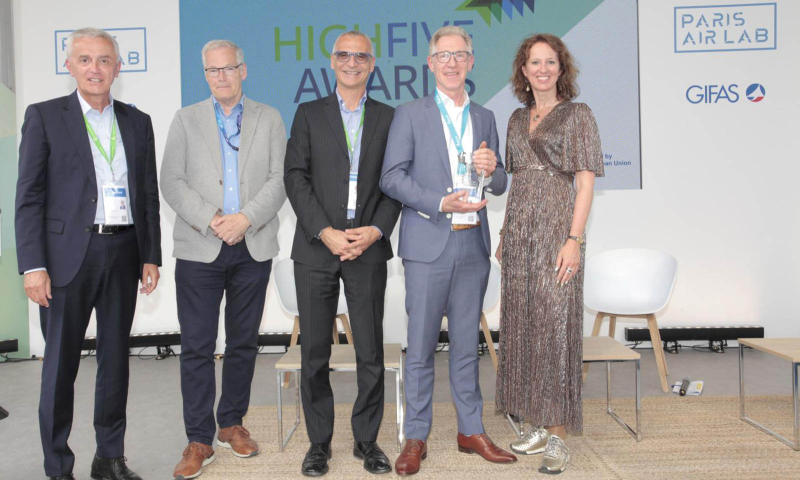Future
Ambassadors for the Future of Aviation
The winners of the Clean Aviation’s High 5 Awards, with their high-profile careers and individual vocations, today, are providing expertise, insights and examples for the aviation transformation.
Nov 2023
The five "Ambassadors" of Clean Aviation - the European Union’s leading research and innovation programme for transforming aviation towards a sustainable and climate-neutral future – are pursuing the key task of promoting the European Union's public-private partnership - between the European Commission through Horizon Europe, the EU research and innovation programme, and the European aeronautics industry - its values and goals, highlighting how essential it is to hit the targets set for climate neutrality by 2030 and 2050.
Relying on budget of €4.1 billion divided into €1.7 billion in EU funding and no less than €2.4 billion in private funding, the programme’s disruptive clean aviation technologies will help reduce the emission footprint of short-medium range aircraft by no less than 30% and -50% for regional range aircraft compared to 2020 state-of-the-art aircraft. Clean Aviation builds on the knowledge and expertise of the Clean Sky programmes executed between 2008 and 2024.
The Ambassadors were awarded and announced during the latest Le Bourget (Paris) air show on June 20 of this year by a jury led by Axel Krein, Executive Director of Clean Aviation, and Rosalinde van der Vlies, Director of Clean Planet, DG Research & Innovation of the European Commission, and made up of top aviation experts from universities, research centers, disruptive industry leaders and media. The CEO of Avio Aero, Riccardo Procacci, was a special guest at the award ceremony and honored to present the recognition to each of the five Ambassadors.
Each of these five trailblazers has high potential and a success story in aviation: they will provide the impetus and inspiration to those in Europe who are engaged in programs and projects to reduce or neutralize the environmental impact of aviation. Companies, research centers, universities and small-medium enterprises that are involved in every capacity (from airports to supply chains to airlines and services) at Clean Aviation to explore innovative hybrid-electric concepts, ultra-efficient aircraft architectures and disruptive hydrogen-powered technologies for the next generation of aircraft.
“Young people seeking out careers where they can have a positive impact on society and the environment, will promptly recognise anything perceived as greenwashing and thus refuse it"
Starting, in strict alphabetical order, from Amelia Gilchrist: a mechanical engineering student at Durham University (UK), who came to the aviation industry through a one-year stint at Rolls-Royce. She has focused on the role played by manufacturing (methods, low-impact processes, technologies), developing solutions and new approaches and implementing measurements, plus she has involved and inspired professionals and business leaders as well as young students. Amelia is in fact also a member of the Manchester Climate Change Board and is active in university associations such as Women in STEM and WISE.
“I believe that, in order to attract and retain young talent, the aviation sector must demonstrate its true commitment to sustainable aviation” says Gilchrist. “Young people are increasingly seeking out careers where they can have a positive impact on society and the environment. So, by sharing the work already being carried out (which is often not seen by those outside of the aviation industry!) and by increasing efforts towards clean aviation, young people will be more attracted to work in the sector. It is also very important to underline that, growing up with sustainability and climate change as key issues, young people will promptly recognise anything perceived as 'greenwashing' and thus refuse it. The aviation industry must ensure that all claims and commitments are supported by evidence and followed by action and funding”.
Amelia Gilchrist thinks that young talent should be exposed and encouraged to contribute to sustainability related work early in their career. “As the next generation who will be working in this sector, it is important for them to gain the relevant skills and knowledge from senior experts too to continue the development and deployment of sustainable flight technologies. With less experience in aviation, they can often be less constrained by 'how thing have always been done' and bring a fresh perspective, and an evident positive impact”, she adds.
"Raising awareness in the whole ecosystem is key to raise the challenge of making aviation more sustainable as we are not in a ‘one takes all’ game"
An engineering graduate from the Université Technologique de Compiègne with a Master's degree in Business and Project Management, Jean-Christophe Lambert is the CEO and founder of Ascendance Flight Technologies. Today, his company focuses on hybrid and all-electric solutions (eVTOL, vertical takeoff and landing) for sustainable aviation, while his technology path over the past twelve years has been largely developed at Airbus, first as business development manager, and then as program manager in projects on hybrid-electric technologies, including the e-Fan project - a two-seater electric plane which flew for the first time in 2015.
“Raising awareness in the whole ecosystem is key to raise the challenge of making aviation more sustainable as we are not in a ‘one takes all’ game” Lambert states. “I really feel awareness is now more and more present in the industry but the question on ‘how’ and ‘when’ is not yet answered and becomes critical for everybody. I spend time in universities, having exchanges with students and researchers because we need the best people to tackle that challenge. I also have deep discussions with certification and regulatory bodies to keep the level of safety that Aviation offers today. Last but not least, it is an everyday task to onboard the whole supply chain too, so that each actor contributes to this new value creation”.
"Aviation will come closer to people as aircraft continue to become more environmentally friendly and quieter"
The director of engineering and programs at Pipistrel - part of Textron Aviation - Tine Tomažič was also honored during the event. His talented academic carrier was based on electric flight and later aviation, a professional experience lasting 20 years. In the past 15 years, Tomažič developed 2- and 4-seater electrical aircraft, plus he has flown and certified the two-seater Velis Electro (first in the world). An expert in automation and hybrid-electric propulsion technologies, he has received several awards and oversees research projects, collaborating on plans, zero emission technical solutions and regulatory standards.
For Tomažič, it is abundantly clear that, today, more technologies are making their way into aviation than ever before. “New materials, new energy storage provisions, new types of propulsion, electrification, digitalization and even AI. This will inevitably have beneficial implications across different aviation scenarios - from ground movements to actual aircraft design - but also on the way how we fly. Aviation will come closer to people as aircraft continue to become more environmentally friendly and quieter. The answer for the future of aviation is not to stop flying, but to get involved. Get involved and participate in this new wave of aviation that will be cleaner, more accessible, and friendlier to the traveler. Today, perhaps for the first time ever, working in aviation means to be doing something great for the people, as well se for the environment” says Tomažič.
"Only 4% of the worldwide flights produce warming contrails, flying slightly higher or lower in dryer or warmer air during those flights can avoid the formation of contrails"
Christiane Voigt comes from the prestigious German Aerospace Center (DLR). She heads the Cloud Physics Department there and is an Ambassador. In addition to her 20-year post at the Institute of Atmospheric Physics, she is a professor at the University of Mainz. Her scientific career has been based on the careful study and measurement of both CO2 and non-CO2 effects, so she has covered all aspects of flight: from routing, propulsion technologies and fuels to condensation trails. She collaborates on international projects and is the author of over 140 publications.
“Reducing CO2 is an important step towards climate compatible aviation, but it is only half of the story” claims Voigt. “In fact, a recent international assessment has shown that the non-CO2 effects, in particular contrails and nitrogen oxides, might have a larger climate impact than all CO2 emitted since historical start of aviation: to achieve climate neutral aviation, both CO2 and non-CO2 must be reduced. Contrails are short-lived, hence their mitigation provides a fast measure to reduce the climate impact from aviation”.
When speaking about the possible ways to reduce contrails, Voigt mentions planning of flight routes and adds more context. “Only 4% of the worldwide flights produce warming contrails, flying slightly higher or lower in dryer or warmer air during those flights can avoid the formation of contrails. This has to be demonstrated in flight trails, while weather and contrail forecasts have to be improved at cruise altitudes to allow accurate prediction of warming contrails. And even sustainable aviation fuels (SAF), if produced with renewable energies from biomass feedstocks, lead to a reduction in soot particle emissions and in contrails - in addition to their lower CO2 footprint from life cycle analysis. At DLR, we have measured these emissions at cruise altitudes in flight campaigns. Also, contrails of future hydrogen technologies have to be investigated to assess the climate impact from hydrogen as a whole”.
"The amount of renewable energy required for aviation is huge, but relatively small compared to the needs from other sectors combined"
Henri Werij, dean at the Technical University of Delft (Netherlands), was honored by Clean Aviation. After an international career in space research launched by a master's degree and a scientific doctorate in atomic and quantum physics, Werij arrived in Delft in 2017 to become dean of the Faculty of Aerospace Engineering. He immediately focused on reducing climate impact and activating partnerships with Dutch companies, airlines and airports, as well as working with other universities. He promoted diversity in appointments to his faculty with excellent results and expanded the involvement of professors, students, and researchers in the challenges for energy transition.
“The quest for a sustainable, climate neutral aviation is fully coupled to the energy transition” explains the dean. “We need to replace fossil fuels by alternative on-board energy carriers, like batteries, hydrogen or sustainable aviation fuel. To be truly sustainable the primary energy in all cases should come from renewable energy sources. The amount of renewable energy required for aviation is huge, but relatively small compared to the needs from other sectors combined. In view of the scarcity of green electricity, aviation thus will compete with other sectors for this sustainable energy. This implies that aviation might be required to invest in and assure its own renewable energy production facilities. And it will certainly require that, apart from overall climate impact, we also focus on minimizing the energy consumption in terms of primary energy need per passenger kilometer. This ultimately requires a truly holistic approach, where the lessons learnt in aviation are also applicable in other sectors and vice versa”.
Cover and page photo credits, Régis Daudeville.



